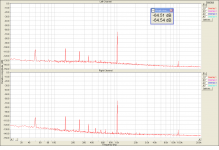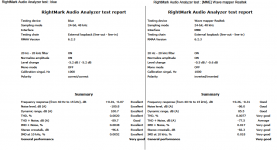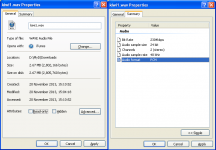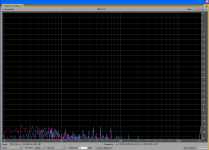I said publicly above that I spent a long time trying to persuade myself that green was better; this was because I had a feeling green was a fraction cleaner.
I didn't manage to pinpoint any concrete difference though so I voted "cannot decide" to avoid getting suckered in case the only difference was swapping the L+R channels or something.
I was mainly listening on headphones using my mp3/laptop/desktop - all of which have audible noise and are perhaps simply not good enough for this test.
People have already said they couldn't hear the difference on headphones but could on speakers. Extended listening tests at high volume on my speakers are not really an option for me.
I didn't manage to pinpoint any concrete difference though so I voted "cannot decide" to avoid getting suckered in case the only difference was swapping the L+R channels or something.
I was mainly listening on headphones using my mp3/laptop/desktop - all of which have audible noise and are perhaps simply not good enough for this test.
People have already said they couldn't hear the difference on headphones but could on speakers. Extended listening tests at high volume on my speakers are not really an option for me.
Another is to change absolute phase. Only some of my true golden pinnae can pick this up and only on certain music.
My questions regarding "fatiguing phenomenon" does not just appear today. I have searched for the answer for years (by finding correlation between perceived sound and simulation, which I have documented for years) and I think I have nailed the answer (but of course this is not for discussion). Yes, phase. The audibility of phase difference. That's the key word.
This is difficult because you have to feel it instead of hear it.
Inverting the phase of one of the channels only would be easier to detect than inverting both of them. Stereo image goes away completely of course. You'd have to be at least half deaf not to be able to hear it.
Wouldn't show up on a standard FFT plot.
Wouldn't show up on a standard FFT plot.
Stuart's is a device so no tricks with files.
The DUT can do time reversal given that file modification is disallowed. This'd work provided the 'reference' DUT has symmetrical IR - i.e. is linear phase. Oh and also has sufficient latency that the usual tests can be run.
Phase reversal modifies the IR. Admittedly IR wasn't in the spec the first time 😀Another is to change absolute phase. Only some of my true golden pinnae can pick this up and only on certain music.
Last edited:
IME, good headphones with a good (there are loadsa bad ones) headphone amp is usually more discriminative than speakers.Inverting the phase of one of the channels only would be easier to detect than inverting both of them. Stereo image goes away completely of course. You'd have to be at least half deaf not to be able to hear it.
Here is one example where its not.
Load a nice stereo file WAV into your DAW, reverse the phase of ONE channel and save the now dodgy stereo file under a different name. Compare the 2 files on
- headphones
- speakers on the centre line exactly between them
- and also seated away from the centre line; the next seat will do
and tell us what you hear.
___________
heb1001, thanks for confirming your choice. What about Max Headroom?
I hope all of you will do the 2nd ABC test when we get round to posting it.
I don't like to argue in cable subject, but experience/feelings is nice to hear and learn from and one can make trials in searching.
BYRTT, I agree on 'audibility' of signal cables. Now, what is audible. In my experience, the biggest difference in cables is in HF and VHF mess (measurable, measured) and/or voltage drops on analog ground wire resulting from mostly capacitive currents that flow from one component to another through power supply stray capacitances or ground loops in case the devices analog grounds are connected to protective earth.
So, I consider the different cable sound to be a result of different faults and I try to avoid both VHF interference and cable signal ground impedance to minimum. Therefore, I do not want to test for something that I consider a fault. I do not believe in explanations based on skin effect.
I would like to ask Jay, heb, Frank and maybe others who have heard the clear difference, which of those sound files do you prefer?
kiwi.wav - FileFactory
orange.wav - FileFactory
or here
http://www.filefactory.com/file/7hvw8cdom40v/kiwi1_wav
http://www.filefactory.com/file/6dk52qr4lkg1/orange1_wav
(the 1st pair would not work in a diffmaker).
They are short, so download should not be complicated. Please make a choice of "slow download" in case you have not an account there.
kiwi.wav - FileFactory
orange.wav - FileFactory
or here
http://www.filefactory.com/file/7hvw8cdom40v/kiwi1_wav
http://www.filefactory.com/file/6dk52qr4lkg1/orange1_wav
(the 1st pair would not work in a diffmaker).
They are short, so download should not be complicated. Please make a choice of "slow download" in case you have not an account there.
Last edited:
Speaking about cables, groundloops, clean humfree files etc., see the effect of 12V transformer table light lamp turned off and on, just magnetic coupling to link cable groundloop. Speaking about -125dB yesterday, right? 😀
Attachments
I would like to ask Jay, heb, Frank and maybe others who have heard the clear difference, which of those sound files do you prefer?
kiwi.wav - FileFactory
orange.wav - FileFactory
or here
kiwi1.wav - FileFactory
orange1.wav - FileFactory
(the 1st pair would not work in a diffmaker).
They are short, so download should not be complicated. Please make a choice of "slow download" in case you have not an account there.
Couldn't find anything on the 4 files.
No, I mean, no sound on the 10s files. Do I need to increase the volume??
That's exactly why I am asking with what hardware you are listening. You should hear the sound at normal level. If not, please increase the volume, there is no danger to make any damage with these files.
That's exactly why I am asking with what hardware you are listening. You should hear the sound at normal level. If not, please increase the volume, there is no danger to make any damage with these files.
Is it a song or a white noise or something? I will check again
Please check again, and tell me. Please tell me with what hardware you are listening (you can use a PM if you are not fine with public disclosure). In this thread many have described their impressions and my humble opinion is that it may strongly depend on the replay devices used, both digital and analog. I am starting to understand Richard (kgrlee) quite well.
Last edited:
Please check again, and tell me. Please tell me with what hardware you are listening. In this thread many have described their impressions and my humble opinion is that it may strongly depend on the replay devices used, both digital and analog. I am starting to understand Richard (kgrlee) quite well.
I'm at work. It's a computer with Realtek onboard soundcard, Logitech 1" speaker, iTune player.
Don't forget that I have always played the files at home too with my transparent speaker. Sometimes I changed to different speakers too. Players too. But I sticked with TDA2030A amplifier even tho I have hundreds of amplifiers at home.
I'm at work. It's a computer with Realtek onboard soundcard, Logitech 1" speaker, iTune player.
Thank you. This might say a lot. Remember I have already posted full set of the Realtek measurements.
Now, for short, see Realtek compared to the 'blue'. Usable dynamic range of the Realtek is about 15 dB worse than that of the blue. And blue is set to -5dB, so in fact the difference in dynamic range of both is 20 dB. That's a lot.
Anyway, I will wait for the others what they hear.
Attachments
Tried other media players, still the same problem.
Absolutely correct, PCM 48kHz/24bit. You should hear something.
Thank you. This might say a lot. Remember I have already posted full set of the Realtek measurements.
You often talk like a politician 🙂
With 2 files recorded through the same chain, just 5 days between the 2 recordings, Diffmaker is able to make a great job (even though the files are not sampled simultaneously), resulting in no audible sound. So this is my 'repeatability'.
(Remark, this spectrum has nothing in common with the 'orange' and 'kiwi' sound files).
(Remark, this spectrum has nothing in common with the 'orange' and 'kiwi' sound files).
Attachments
- Status
- Not open for further replies.
- Home
- General Interest
- Everything Else
- Ultimate listening test ... test your ears and audio chain




